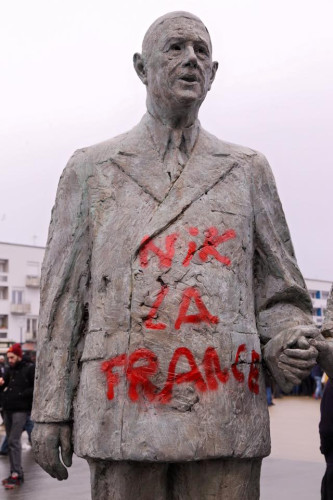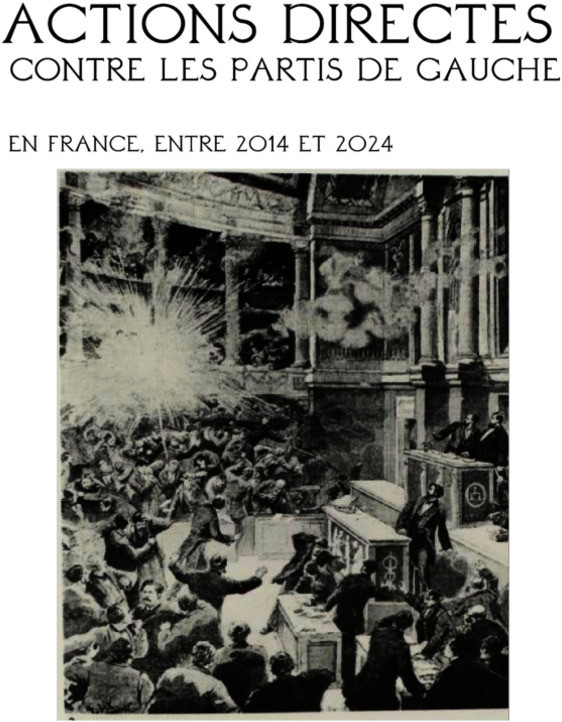From the Open-Publishing Calendar
From the Open-Publishing Newswire
Indybay Feature
5 Reasons Not To Celebrate The Parliamentary Left Victory In "France"
If there is anything to celebrate in contemporary French politics, perhaps it is the vibrant resistance movements against "France"—and it's world.
1. Kanaky
France is currently involved in the violent repression of an anti-colonial uprising in the Pacific archipelago of Kanaky. The French have occupied the islands for over 170 years.
2. The Caribbean
Martinique, Guadeloupe, Guyane, St. Barth, and half the island of Soualiga continue to be held as colonies by the government in Paris, which euphemistically renamed its possessions "overseas collectivities" to avoid UN scrutiny. Most of the human population of these communities are the descendants of Africans, kidnapped and transported across the Atlantic ocean to be exploited for generations by European slaveholders.
3. Polynesia
Would you give away your homeland to be exploited as a testing space for nuclear bombs—while you were still living there? As have other empires against other indigenous peoples, France imposed this situation on those living on the hundreds of Polynesian islands without bothering to wait for an answer. Predictably, many have decided enough is enough.
4. Fortress Europe
Mainland France, also known as l'hexagone, is a central player in the international border regime that has been responsible for untold thousands of deaths in the Mediterranean and the English Channel. Through its colonies La Réunion and Maoré, it even extends the regime of displacement and deportation into the Indian Ocean.
5. Palestine
Alongside its political and military support for the Israeli government, French official philosemitism and the decades-long imprisonment of Georges Abdallah are particular examples of a consistent practice of European white supremacy. Just as many of us would reject arguments to hail the victory of a left-wing "Israeli" party as anything other than a rebrand of the old colonial machine, we should regard the domestic politics of its longtime ally "France"—which has carried out equally brutal massacres for much longer—with the same perspective.
If there is anything to celebrate in contemporary French politics, perhaps it is the vibrant resistance movements against "France"—and it's world.
Add Your Comments
Comments
(Hide Comments)
« Si nous défendons la révolution sociale, alors notre critique, et l’action qui en découle, ne peut épargner cette gauche politicienne et autoritaire ».
For more information:
https://trognon.info/Brochure-Actions-dire...
the following is a short review of the colonial policies of the so-called ‘new popular front’.
starting with Palestine, they adopt the mainstream liberal bothsideism which is just uninteresting to comment on, calling “to immediately recognize the state of Palestine alongside the state of Israel” (sic) and notably, “the liberation of Palestinian political prisoners”. but no mention is made of George Ibrahim Abdallah, or other political prisoners.
and so with no surprise, their carceral policies doesn't make waves either. they want “to ensure dignified conditions of detention” (commendable if there existed such a thing - it's anyhow followed by an equal contradiction) “to provide the prison and judicial administration with the means to carry out its mission”
for the continent, they plan a vague “diplomacy with Africa based on sovereignty and cooperation between peoples”: they have no vision, and reform or abandonment of the hexagon's economic imperialism - now that the military has been booted out - isn't on the agenda.
on policing, and besides its pledge to increase the number of judicial pig officers, it promises to deploy teams of “police de proximité” which are forces thought to “re-strengthen ties with a population in order to prevent crime”. bullshit clarified, they're occupation troops charged with intelligence gathering and intimidation, with “crime” typically being “non-white youth existing in public space”. this policy are supposedly in opposition with the reactionaries' “shock troop” approach to policing internal neo-colonies, but the two are typical components of counter-insurgent strategy.
as for overseas colonies, regarding Maore, they introduce their reform project for “the poorest department of france” by pledging to stop making the island “a second class territory of the Republic”. by that they did not mean that the would return the island to the Comoros.
then, it proposed for Kanaky to abandon the project of granting voting rights to settlers which would have happened anyway because of the dissolution. in other words: let's go back to business as usual. it is true that the insurrection had been triggered by a failure to go back to the status quo, but the unrest hasn't stopped despite the dissolution which means the demands have escalated too, and the institutional left hasn't followed.
so here you go. maneuvers of party apparels while interesting shouldn't be the focus. the question is whether the social forces mobilized for this round can grow and maintain their momentum or if they have effectively been short-cut. keep in mind that this program is not nearly as ambitious as the communist and socialist parties program of the 80s, that the 1930s popular front this coalition emulates was forced to deliver on its electoral promises by a general strike, that union militancy in france is arguably as strong as it were during the unrest against the pension reform (which passed), and that Petain did end up in power.
starting with Palestine, they adopt the mainstream liberal bothsideism which is just uninteresting to comment on, calling “to immediately recognize the state of Palestine alongside the state of Israel” (sic) and notably, “the liberation of Palestinian political prisoners”. but no mention is made of George Ibrahim Abdallah, or other political prisoners.
and so with no surprise, their carceral policies doesn't make waves either. they want “to ensure dignified conditions of detention” (commendable if there existed such a thing - it's anyhow followed by an equal contradiction) “to provide the prison and judicial administration with the means to carry out its mission”
for the continent, they plan a vague “diplomacy with Africa based on sovereignty and cooperation between peoples”: they have no vision, and reform or abandonment of the hexagon's economic imperialism - now that the military has been booted out - isn't on the agenda.
on policing, and besides its pledge to increase the number of judicial pig officers, it promises to deploy teams of “police de proximité” which are forces thought to “re-strengthen ties with a population in order to prevent crime”. bullshit clarified, they're occupation troops charged with intelligence gathering and intimidation, with “crime” typically being “non-white youth existing in public space”. this policy are supposedly in opposition with the reactionaries' “shock troop” approach to policing internal neo-colonies, but the two are typical components of counter-insurgent strategy.
as for overseas colonies, regarding Maore, they introduce their reform project for “the poorest department of france” by pledging to stop making the island “a second class territory of the Republic”. by that they did not mean that the would return the island to the Comoros.
then, it proposed for Kanaky to abandon the project of granting voting rights to settlers which would have happened anyway because of the dissolution. in other words: let's go back to business as usual. it is true that the insurrection had been triggered by a failure to go back to the status quo, but the unrest hasn't stopped despite the dissolution which means the demands have escalated too, and the institutional left hasn't followed.
so here you go. maneuvers of party apparels while interesting shouldn't be the focus. the question is whether the social forces mobilized for this round can grow and maintain their momentum or if they have effectively been short-cut. keep in mind that this program is not nearly as ambitious as the communist and socialist parties program of the 80s, that the 1930s popular front this coalition emulates was forced to deliver on its electoral promises by a general strike, that union militancy in france is arguably as strong as it were during the unrest against the pension reform (which passed), and that Petain did end up in power.
For more information:
https://ni.hil.ist/@alks/112751313227397940
We are 100% volunteer and depend on your participation to sustain our efforts!
Get Involved
If you'd like to help with maintaining or developing the website, contact us.
Publish
Publish your stories and upcoming events on Indybay.
Topics
More
Search Indybay's Archives
Advanced Search
►
▼
IMC Network




